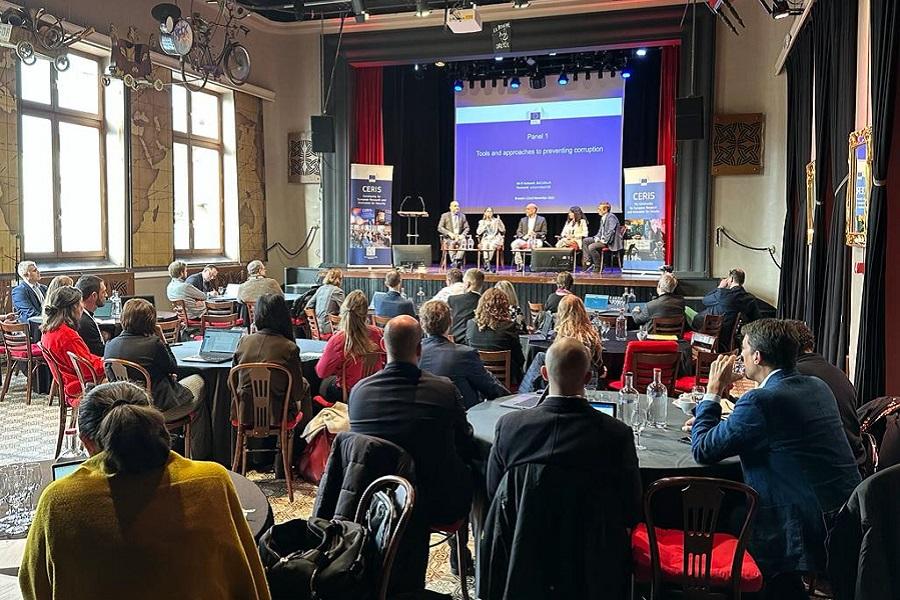
Researchers, policy makers, practitioners and civil society came together, as part of the Community for European Research and Innovation for Security (CERIS), to discuss how ongoing anti-corruption research projects can lead to new and enhanced tools to prevent, detect and fight corruption. The workshop took place the 22 November in Brussels and helped to identify synergies between ongoing projects and to exchange best practices.
The European Commission presented its 2023 anti-corruption package. Aside from proposing an important update to the criminal law regarding corruption in the EU, it also established the EU network against corruption as a key platform in stepping up efforts against corruption. The Commission is currently working on mapping high-risks sectors for corruption by 2024. Insights from research and inputs from researchers are key to identify emerging trends.
Marta Cygan, Director of Innovation and Audit in DG HOME, and Stephen Curzon, Head of Unit of Legal affairs and Anti-corruption, opened the workshop, underlining the central role of anti-corruption measures in European strategies. Mr Curzon stressed that corruption not only affects the economy impacting the efficiency of public spending, but it erodes the trust in public institutions, as Qatargate clearly showed. The European Commission is deeply committed to fighting corruption as the proposal of Commissioner Ylva Johansson on anti-corruption demonstrates.
The first panel discussed “Tools and Approaches to Preventing Corruption”. Prevention of corruption covers a broad spectrum, ranging from supporting national authorities to implement relevant integrity reforms, to raising awareness in the general public about corruption and integrity. Representatives from DG HOME, DG REFORM, the Erasmus+ project Empowering YOUth to build MONITORial communities against corruption and the TSI project Leveraging behavioural Sciences to foster Integrity discussed the challenges in explaining to young people what “corruption” means and how individuals can fight corruption in their daily life.
Later on, participants engaged in discussions on “Detection and investigation of corruption crimes”, with a specific focus on the role of information and communication technologies (TRACE, POSEIDON, DIGIWHIST). The TRACE project aims at providing a new tool capable of analysing structured and unstructured data and to answer to the needs of law enforcement agencies. POSEIDON looks at corruption vulnerabilities and risks in seaports and brings stakeholders together to reach better cooperation. Building upon DIGIWHIST, which identified the risky areas of public procurement – highlighting them via the website opentender.eu - the new project iMONITOR enables citizens to monitor ongoing procurement procedures and report suspected corruption to law enforcement. In the same panel, Antonio Miceli, Head of Unit responsible for internal investigations at the EU Anti-Fraud Office (OLAF), presented the EU legal framework and results of OLAF in detecting and investigating corruption and other serious misconduct by members and staff of the EU institutions.
A specific panel was devoted to “New and emerging challenges related to corruption”. This includes recent research on political party financing (PFCorr). On the other hand, the newly launched FALCON project seeks to gather data to assess risks and bring forward innovative solutions in the fight against corruption and organised crime. The projects representants shared the floor with a Senior Advisor from the Basel Institute on Governance who explained how environmental crime is fuelled by corruption and how reducing corruption would slow environmental degradation.
Thanks to the audience participation and the knowledge of the panellists this workshop helped to identify the future steps to face this challenging threat of corruption.
Next year, the European Commission will map funding opportunities in the anticorruption and integrity field to ensure coherence and contribute to the visibility of research in the area. The workshop gathered in one place projects funded under several EU programmes, notably Horizon 2020, Horizon Europe, Internal Security Fund, Technical Support Instrument (TSI), Erasmus+ and ERC.
Details
- Publication date
- 8 December 2023
- Author
- Directorate-General for Migration and Home Affairs
